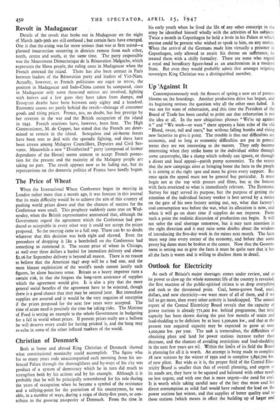Christian of Denmark
Both at home and abroad King Christian of Denmark showed what constitutional monarchy could accomplish. The figure who for so many years rode unaccompanied each morning from his un- fenced Palace through the thoroughfares and by-ways of his city was product of a system of democracy which he in turn did much to strengthen both by his actions and by his example. Although it is probable that he will be principally remembered for his role during the years of occupation when he became a symbol of the resistance and a rallying-point for the patriotism of his countrymen, he was able, in a number of ways, during a reign of thirty-five years, to con- tribute to the growing prosperity of Denmark. From the time in his early youth when he lived the life of any other conscript in the army he identified himself wholly with the activities of his subjects. Twice a month in Copenhagen he held a levee in his Palace at which anyone could be present who wished to speak to him, on any matter. When the arrival of the Germans made him virtually a prisoner in Copenhagen, only allowed to retain his throne on sufferance, he treated them with a chilly formality. There are some who regard a royal and hereditary figure-head as an anachronism in a modern State. But even they would probably admit that amongst reigning sovereigns King Christian was a distinguished member.


































 Previous page
Previous page